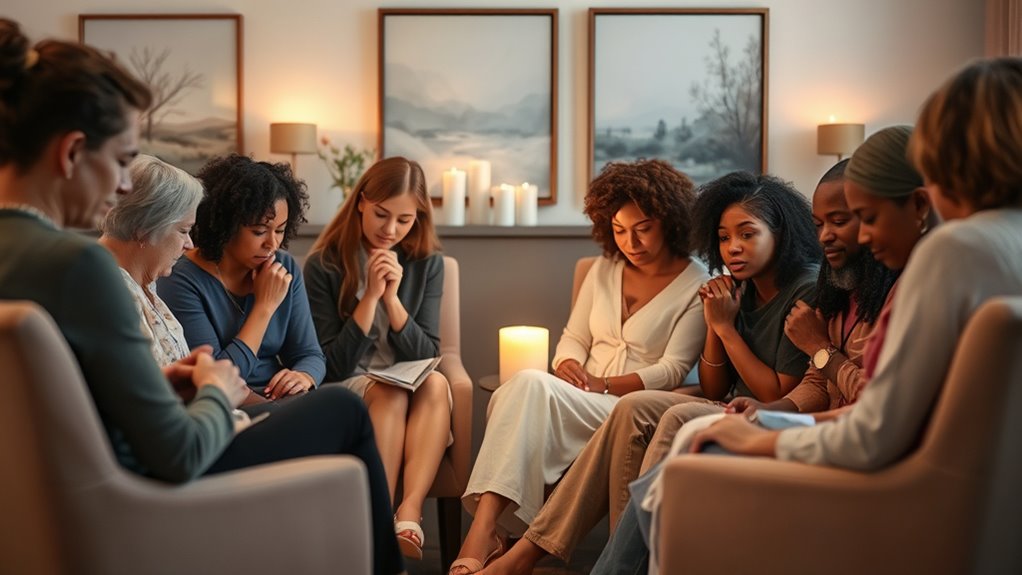Support groups for narcissistic abuse survivors provide a safe space where you can share your experiences, find emotional validation, and learn coping strategies. These groups help reduce feelings of isolation, rebuild confidence, and teach healthy boundaries. Whether online or in person, they offer peer support, professional guidance, and resources for ongoing recovery. Continue exploring how these communities can support your healing journey and strengthen your resilience over time.
Key Takeaways
- Online platforms like MyNARA and Facebook groups offer accessible, confidential support for narcissistic abuse survivors.
- Local community centers and non-profit organizations often host in-person support group meetings.
- Professional-led groups provide structured therapy and educational resources for long-term recovery.
- Effective groups include trained facilitators, peer support, and activities focused on emotional validation and boundary setting.
- Ongoing participation in support groups improves resilience, reduces isolation, and fosters personal growth.
Understanding the Prevalence of Narcissistic Abuse
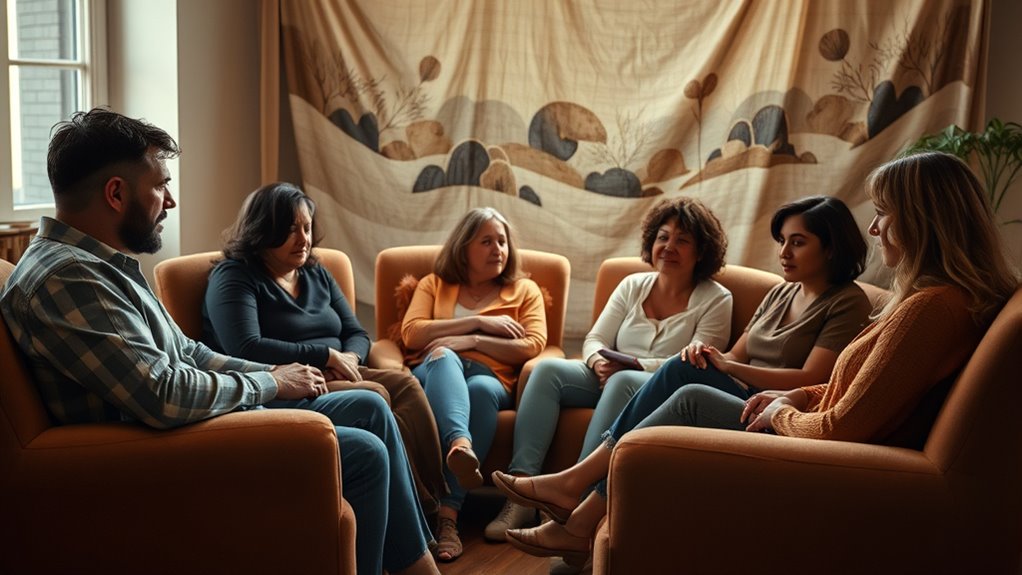
Understanding how common narcissistic abuse is can help you recognize its impact and the importance of support. Narcissistic abuse, often carried out by individuals with narcissistic traits, affects millions.
With an estimated 6.2% of the population diagnosed with Narcissistic Personality Disorder (NPD), many victims face emotional and psychological harm. Men tend to show higher rates of NPD, but anyone can be affected. The prevalence of NPD highlights the widespread nature of these personality traits and their potential for harm. Additionally, eye patches are often used in skincare routines to address issues like puffiness and fine lines, reflecting the importance of self-care in recovery processes. Recognizing the genetic variation that causes unique traits in dog breeds can also help foster understanding and acceptance of individual differences. This genetic diversity in traits underscores how individual differences, even in personality disorders, are natural and can influence behavior.
Approximately 6.2% of people have NPD, impacting many regardless of gender.
Over 60 million people may experience narcissistic abuse, especially within intimate relationships. Survivors often suffer long-term effects like anxiety, depression, and low self-esteem. Recognizing these effects can be crucial for seeking appropriate support and healing.
Awareness of this issue has grown considerably, helping more people understand the widespread nature of the problem. Recognizing how prevalent narcissistic abuse is can motivate you to seek the support and healing you deserve. Understanding the role of projectors in emotional abuse can also provide additional insights into relationship dynamics.
The Importance of Support Groups in Healing
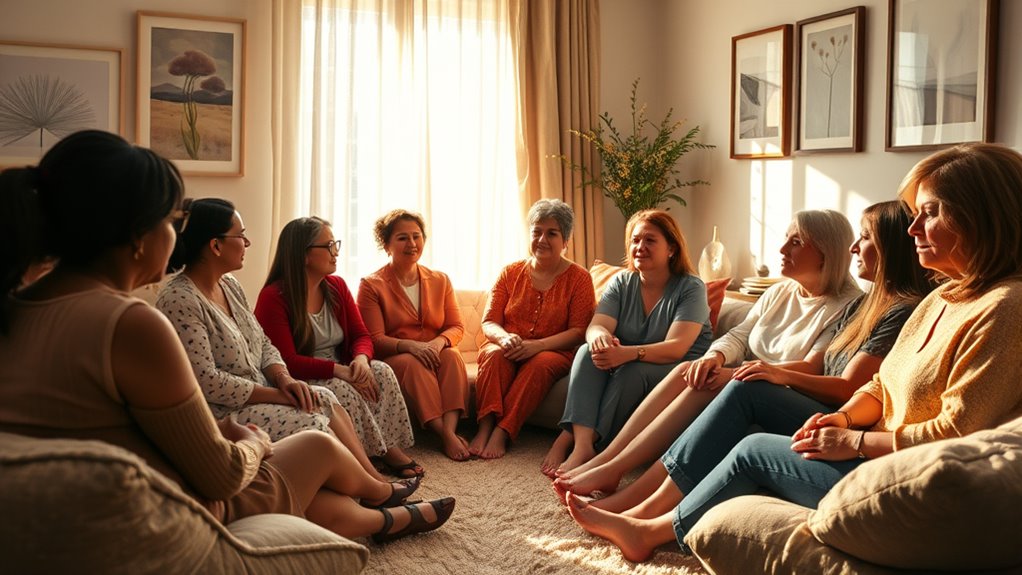
Support groups play a vital role in healing from narcissistic abuse by providing a safe space where survivors can share their experiences and feel truly understood. This support helps you feel validated and reduces feelings of isolation, which many survivors face. Through shared stories, you gain empathy and learn practical coping strategies that you can apply daily. Support groups also offer access to professional guidance, such as therapists or educational resources, making it easier to navigate complex emotional and legal issues. Being part of a community fosters collective healing, allowing you to develop resilience and regain confidence. The connections formed provide ongoing emotional safety and support, essential for long-term recovery and personal growth. Additionally, understanding the power of shared experiences can significantly enhance the healing process by reinforcing that you are not alone in your journey. In these groups, healing becomes a shared journey toward strength and renewal, where the collective resilience of the community can inspire hope and perseverance. Recognizing the importance of support systems, many survivors find that ongoing participation in these groups helps maintain their progress and prevents relapse into old patterns. Incorporating spiritual practices such as meditation or prayer within support groups can also promote emotional stability and inner peace during healing. Moreover, integrating AI-driven tools that offer personalized coping strategies can enhance the support experience by addressing individual needs more effectively.
Ways to Find Suitable Narcissistic Abuse Support Groups
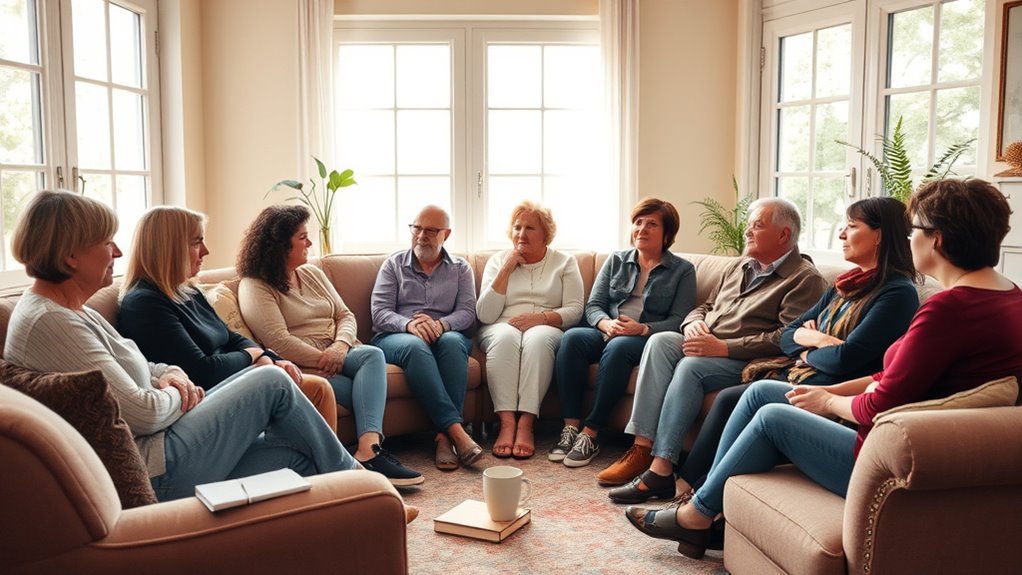
Finding the right narcissistic abuse support group involves exploring various avenues tailored to your needs. Online platforms like MyNARA offer professionally guided recovery, while social media groups on Facebook connect you with others sharing similar experiences.
You can also reach out to therapists or counselors who specialize in narcissistic abuse—they might host online or in-person groups. Event platforms like Eventbrite list virtual webinars and local support meetings. Additionally, some organizations provide evidence-based approaches that can enhance your healing journey. Incorporating therapeutic methods into your support system can further strengthen your recovery process.
For in-person options, check community centers or ask local therapists for recommendations. Word of mouth from other survivors can be invaluable, and non-profit organizations often facilitate support groups. Additionally, understanding different support group formats can help you choose the one best aligned with your comfort level and needs. Recognizing the importance of safe and confidential environments is crucial to fostering trust and openness during your healing process. Creating a supportive environment where members feel secure encourages honest sharing and mutual understanding.
Core Elements That Make Support Groups Effective
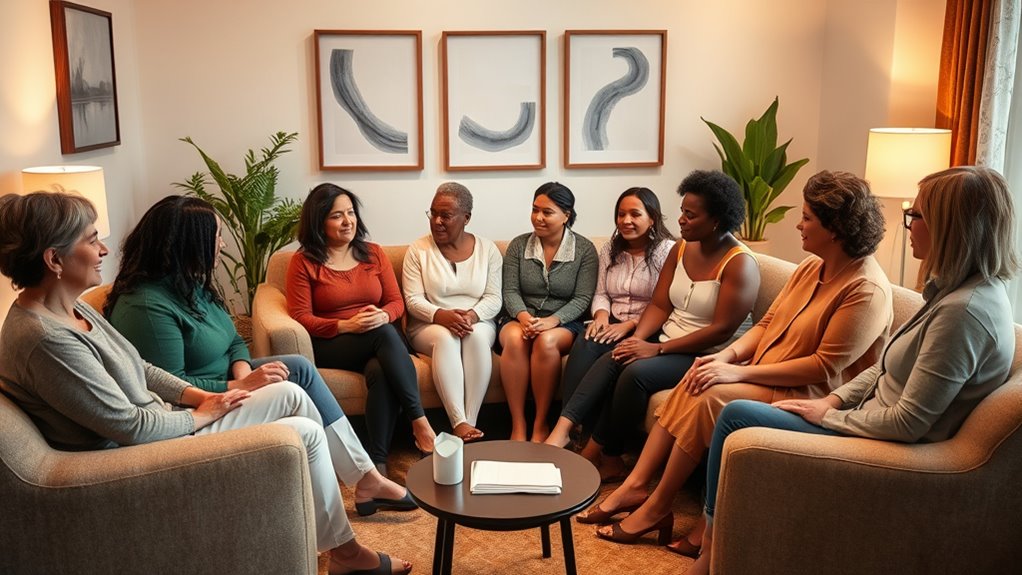
The effectiveness of a support group largely depends on its core elements, which create a foundation for healing and growth. Trained facilitators who understand narcissistic abuse provide expert guidance, guaranteeing a structured, safe environment where survivors feel comfortable sharing. Health benefits of supportive environments can also enhance emotional resilience and overall well-being. Their leadership helps manage group dynamics, preventing re-traumatization and encouraging supportive interactions. A non-judgmental space filled with empathy allows members to express feelings freely, fostering trust and community. Structured activities like workshops and therapeutic techniques address emotional trauma and promote resilience. Peer support strengthens connections, reducing isolation and empowering survivors through shared experiences. Additionally, access to resources and ongoing expert guidance ensure long-term recovery, equipping you with tools to manage challenges and emotional healing. Creating a safe space is especially important when considering the support group format, which relies heavily on trust and open communication. Incorporating therapeutic techniques grounded in trauma-informed care can further enhance recovery outcomes.
How Support Groups Contribute to Emotional Validation and Education
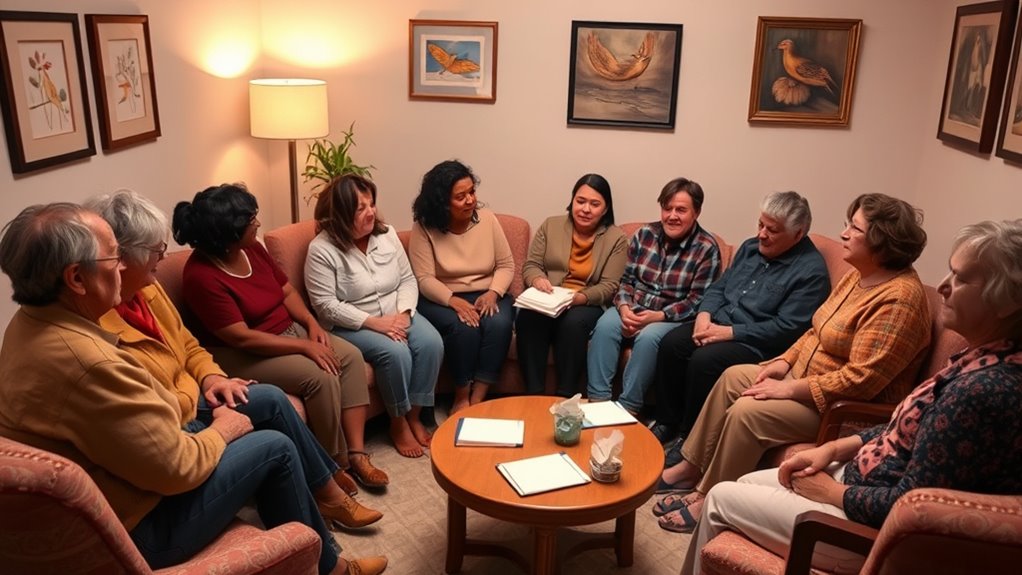
Support groups foster emotional validation and education by creating a space where survivors can openly share their experiences without fear of judgment. You’ll find comfort knowing others understand your feelings because they’ve faced similar challenges.
Facilitated by trained professionals, these groups ensure the environment remains supportive and focused on healing. Sharing your story helps validate your emotions, which is crucial for recovery. It also provides emotional release, allowing you to express suppressed feelings.
Education plays a key role by teaching you about narcissistic abuse dynamics, manipulation, and gaslighting. Many groups incorporate therapeutic tools like CBT and resource sharing, helping you understand your thought patterns and rebuild trust. Recognizing diverse healing approaches can further empower your recovery journey. Additionally, understanding emotional validation is vital for rebuilding self-esteem and trust in your perceptions. Incorporating knowledge of annuity features and their protections can serve as an analogy for understanding how different support systems can offer stability and security in your healing process. Recognizing the importance of self-care strategies can also enhance your resilience and ongoing recovery.
By engaging in these supportive environments, survivors can also learn about healthy boundaries, which are essential for protecting themselves in future relationships and fostering personal growth.
The Role of Community and Peer Support in Recovery

Community and peer support play an essential role in your recovery by creating a safe space where you can share experiences and feelings without fear of judgment. In these groups, you’ll find others who understand your journey, helping normalize your feelings and reduce isolation. Sharing stories builds trust and empathy, which are crucial for healing. You’ll also gain practical insights from others’ coping strategies, empowering you to navigate your recovery. Additionally, these environments encourage openness, allowing you to express yourself freely. Research shows that support groups can significantly improve emotional well-being and resilience during recovery. Beyond emotional support, community education raises awareness about narcissistic abuse, helping you recognize signs and develop skills like setting boundaries. This collective effort fosters resilience and personal growth, giving you the strength to move forward confidently. Knowing about privacy policies and how your information is protected can also provide reassurance in these supportive environments.
Long-Term Benefits of Participating in Support Groups

Participating in support groups offers lasting benefits that can considerably enhance your recovery journey. You’ll find emotional support in a safe space, allowing you to release feelings and gain understanding. This reduces feelings of loneliness and isolation, helping you feel connected.
Sharing experiences builds empathy for yourself and others, validating your emotions and improving your emotional health. Over time, you’ll rebuild confidence, learn to set healthy boundaries, and develop assertiveness skills that empower you.
Access to professional guidance, educational resources, and counseling strengthens your progress. Long-term participation fosters resilience, emotional stability, and personal growth.
It also creates a reliable community network, offering ongoing support as you navigate life beyond abuse. These benefits help ensure your recovery is sustainable and rooted in strength.
Strategies for Sustaining Recovery and Building Resilience
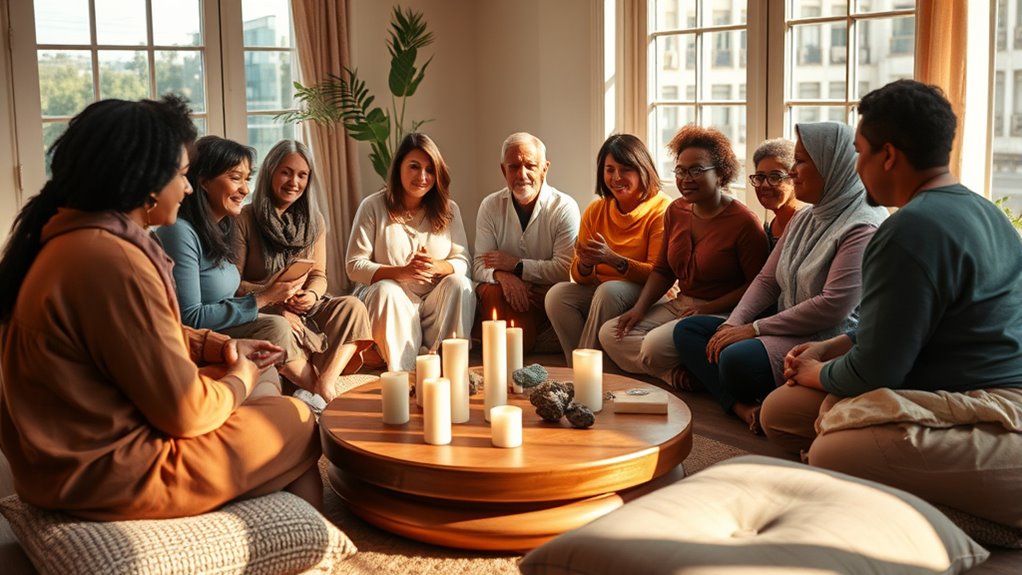
Building on the emotional strength you’ve gained through support groups, adopting specific strategies can help you maintain your recovery and develop resilience.
First, acknowledge the abuse to validate your experiences and emotions, helping you move forward.
Set clear boundaries to protect yourself from further harm, and seek professional help to guide your healing journey.
Practice self-care regularly through activities like exercise and meditation to foster wellness.
Building support networks with friends, family, or groups keeps you connected and understood.
Educate yourself about narcissistic traits to better understand your experiences.
Focus on personal growth by exploring new hobbies, and manage stress with mindfulness techniques.
Recognize your emotions and practice self-compassion, which strengthens resilience and supports ongoing recovery.
Frequently Asked Questions
How Do I Know if a Support Group Is Right for Me?
You know a support group is right for you when it aligns with your recovery goals and makes you feel comfortable sharing. Pay attention to how well the group fosters respect, empathy, and trust.
If you find the environment non-judgmental and helpful, and if the format fits your schedule and needs, then it’s likely a good fit.
Trust your instincts and prioritize your emotional safety in making this decision.
Are Online Support Groups as Effective as In-Person Ones?
You might worry online support groups aren’t as effective as in-person ones, but research shows they can be just as impactful. You get emotional support, community, and guidance from trained facilitators, all from the comfort of your home.
The flexibility and anonymity help you participate consistently and openly. So, whether online or in person, the key is finding a safe space where you feel supported and understood in your healing journey.
What Should I Expect During My First Support Group Session?
During your first session, you can expect introductions and an overview of how the group works.
You’ll have the chance to share your story if you feel comfortable, and the group will establish norms to keep things safe and confidential.
The session might include guided sharing, discussions, and some emotional preparation.
How Can I Protect My Privacy in Support Group Settings?
To protect your privacy, you can set boundaries, choose what to share, and decide when to speak.
You can remain anonymous, participate in general discussions, and avoid sharing personal details outside the group.
You can trust the confidentiality agreements, follow group guidelines, and observe the leaders’ oversight.
You can also use secure channels, attend consistently, and stay mindful of your comfort level—because your privacy matters at every step.
Can Support Groups Help With Severe Emotional Trauma From Abuse?
Support groups can definitely help with severe emotional trauma from abuse. They provide a safe space where you can share your experiences, gain emotional validation, and learn coping strategies.
The group environment reduces feelings of isolation and shame, helping you rebuild trust and self-esteem.
Peer support workers offer relatable insights, making healing feel more achievable.
Conclusion
Joining a support group isn’t just about healing; it’s about reclaiming your strength and rewriting your story. Like a beacon in the dark, these groups illuminate the path forward, reminding you that you’re not alone. Embrace the community, share your journey, and let resilience blossom. Remember, even the smallest step toward connection can ignite a powerful transformation—because healing begins when you realize you’re part of something greater.

